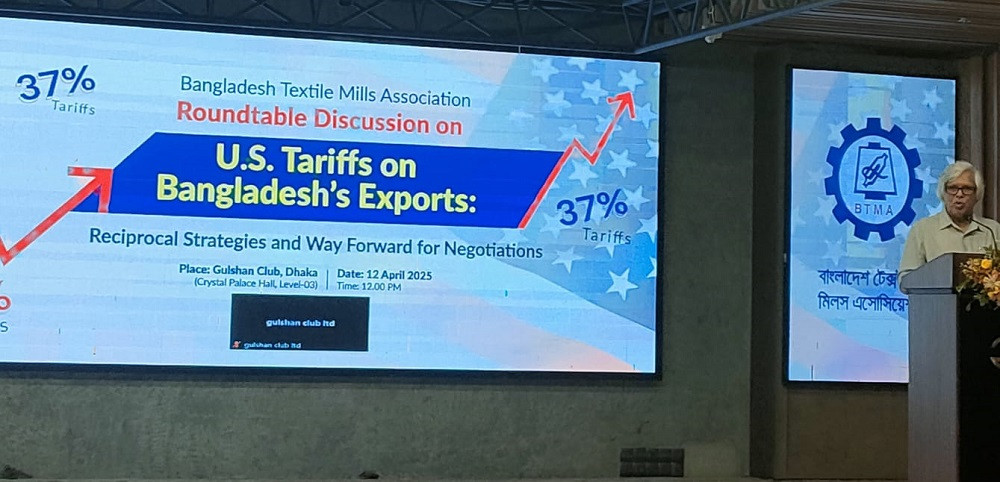Staff Correspondent
Published:2025-04-12 20:42:35 BdST
Business leaders seek strategic negotiations to address tariff challenges
Business leaders and trade experts at a discussion on US tariffs on Saturday emphasised that strategic negotiations and industrial capacity building are crucial for Bangladesh to navigate tariff-related challenges.
They stressed the importance of collective efforts from both the private and public sectors to resolve tariff issues with the United States.
The observations came at a discussion titled “US Tariff on Bangladesh’s Exports: Reciprocal Strategies and Way Forward for Negotiation”, held at Gulshan Club.
Speakers called for increasing the US content in manufacturing to 20 percent or more to qualify for a reduced tariff of 10 percent when exporting to the US market.
Highlighting the high yield and low waste (only 9 percent) of US cotton, they suggested increasing imports of US cotton.
The business leaders suggested that setting up US cotton storage facilities in Bangladesh should be explored, as it could help reduce import lead time and eliminate non-tariff barriers, thereby facilitating easier imports from the US.
They also emphasised that Bangladesh could expand its exports to the US through product diversification and by encouraging US entrepreneurs to invest in the country’s industries.
In addition to the government’s ongoing efforts in tariff discussions and Free Trade Agreement (FTA) negotiations, speakers highlighted the need to involve the US private sector in the dialogue.
They further stressed the importance of strengthening infrastructure and industrial capacity, along with enhancing human resource skills, to help domestic industries remain competitive globally.
While expressing optimism that the ongoing tariff war might create new export opportunities, they cautioned that without significant improvements in local capacity, Bangladesh might fail to capitalise on these prospects.
Speakers noted that major manufacturing countries have already begun relocating their industries in response to global trade uncertainties.
Bangladesh should seize this opportunity by offering land, infrastructure, and supportive policies to attract global manufacturers.
The discussion also called for enhancing the capabilities of government officials and upskilling human resources to better address these challenges and turn them to Bangladesh’s advantage.
Key participants included Hafizur Rahman, Administrator of FBCCI; Abdul High Parker, President of Bangladesh Association of Banks (BAB); Anowar Hossain, EPB Vice Chairman and BGMEA Administrator; Anower-ul Alam Chowdhury Pervez, President of BCI; Zonaed Ahmed Saki, Chief Coordinator of Gono Sanghati Andolon; Shamim Ahmed, President of Bangladesh Plastic Goods Manufacturers and Exporters Association (BPGMEA); and Muhibuz Zaman, Managing Director of ACI Healthcare, among others.
Shawkat Aziz Russel, President of BTMA, presided over the programme.
Masrur Reaz, Chairman of Policy Exchange Bangladesh, made a presentation on the US tariff challenges facing Bangladesh.
This issue is of major concern as the United States remains Bangladesh’s single largest export destination, accounting for nearly 20 percent of total Ready-Made Garment (RMG) exports, valued at $7.34 billion in 2024.
Unlike a flat tariff rate, US tariffs vary by country: China faces 145 percent, India 26 percent, Pakistan 29 percent, and Indonesia 32 percent.
Bangladesh currently faces a 37 percent additional duty - higher than many of its competitors.
This is particularly disheartening given that Bangladesh has been a consistent importer of US cotton for years, while countries like India import little to none.
Based on this, Bangladesh’s tariff rate should logically be lower than India’s. The complexity is further deepened by a content-based adjustment mechanism that favours exports incorporating US-origin inputs.
Unauthorized use or reproduction of The Finance Today content for commercial purposes is strictly prohibited.


